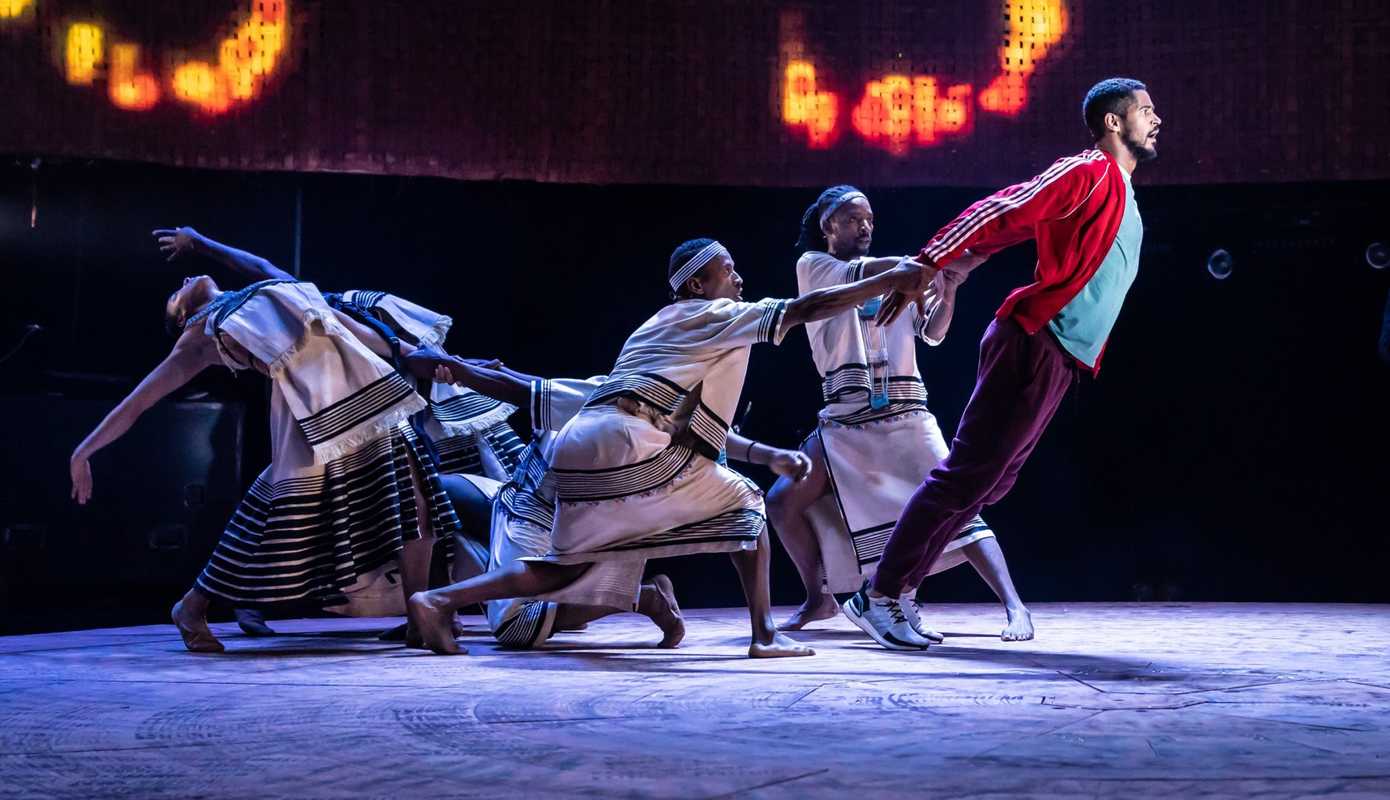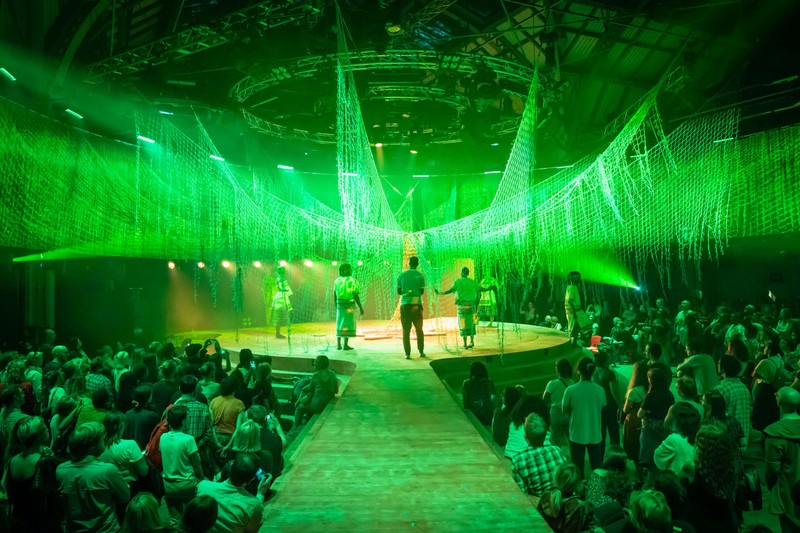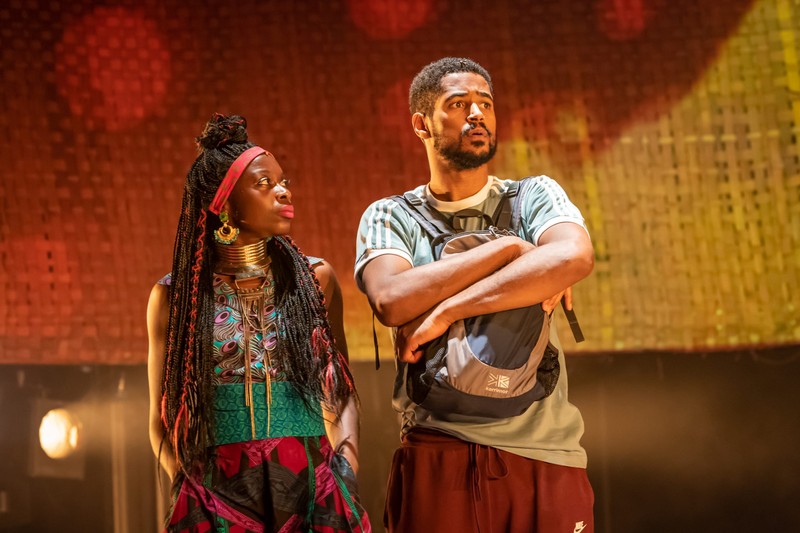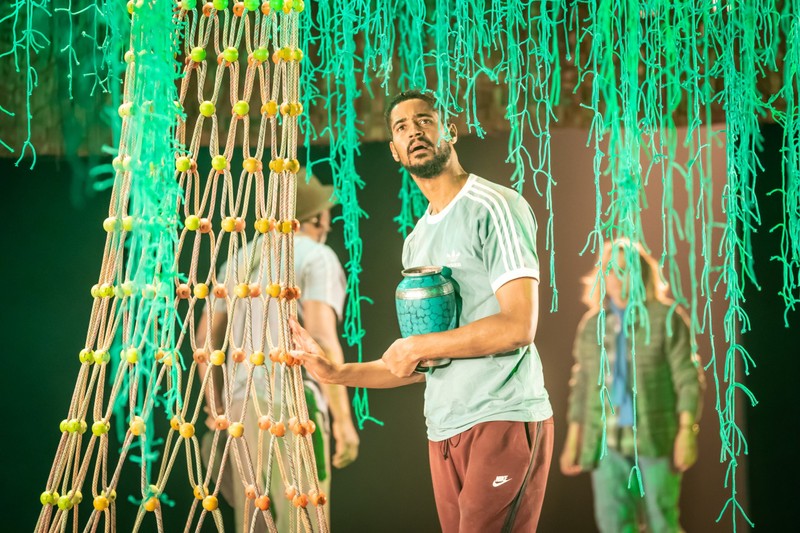Nkenna Akunna: What made you want to come back to London, to theatre here?
Alfie Enoch: Its funny, people often ask, ‘what are you doing in London?’ or, ‘how are you liking the UK?’ And I’m like, I’m from north London. I never left! I was very fortunate to get a gig [How To Get Away with Murder] in the States, it’s probably been more seen than I imagined at the time. And obviously you stop to think about it when you do a job. But it’s interesting the way that that then defines you for people. I went to do a job that was shot somewhere else, and when it was done, I came back home.
NA: I’m interested in what you think of that assumption, one I was clearly guilty of, that you left London.
AE: I don’t mind it. A lot of actors move to the States and get to Hollywood. I mean, my relationship with acting is first and foremost through my dad who’s an actor who worked almost entirely in the UK. Obviously this is my home, this is where I go to the theatre, this is where I can afford to go to the theatre. So this is always gonna be the place where I want to be both in my life and in my career. My main frame of references are English culture. Working in the States has exposed me to things I wouldn’t have been exposed to otherwise; the industry’s bigger, as a black actor there are more stories for you, or certainly that has traditionally been the case. So it was amazing for my career and personally in all sorts of ways, but I’m not trying to move to America. I find it interesting that the conversation is often framed to discredit the UK film industry, like there is a kind of assumed superiority on the other side of the Atlantic. Which I don’t see.
NA: I’m glad you brought that up. Part of what I want to talk about, and what I thought about a lot while watching Tree, is how stories explicitly dealing with ideas of ‘global’ blackness, or rather of the diaspora, are very rarely from our perspective as Black British people. I’ve spent so much of my life mapping my experience onto an American experience – a continental Nigerian experience.
AE: In the context of the diaspora there’s a visible black American experience. The pervasiveness of American pop culture has given that experience to many communities around the world – not just black communities. I’ve been an obvious beneficially of that but it does slightly baffle me.
NA: I think the difference in opportunities for Black British actors, and also these idea of ‘making it’ and leaving home, can be partially explained by that pervasiveness. Of course there are also other factors at play. I wonder whether you think any of that is shifting? With Artistic Directors like Kwame Kwei-Armah at the Young Vic, Lynette Linton at the Bush Theatre, and Roy Alexander Weise at the Manchester Royal Exchange, do you see a change in the tide for theatre?
AE: I think it is happening, and I think that’s a very positive thing. It’s important that we can speak to and of our own experiences. I think in America, there’s something unavoidable about the black experience. It can’t be denied, it can’t be erased and it exists within the broader conception of that country’s history, in a way that it doesn’t in our conception of our history, until post-war. Which of course is simplistic and inaccurate.
NA: Black British people have been ‘here’ since ‘here’ has existed, but that identity has been quite transitional. I don’t think, until recent decades, that we’ve been here in large enough numbers to ensure we are not erased.
AE: Yes. What is one of the main things we export in this country? Period dramas. My dad’s white, he has brown hair and blue eyes. When he was working he played [parts like] Nicholas Nickleby. These are parts that I haven’t played yet and that I probably never will. If I looked like him I would have done at least one period drama by now. And I haven’t. In America, their period dramas are more likely to have a part for a person of colour. Now the question of whether that person of colour is put in the forefront or background, or how much their story is truly present, is another conversation.
NA: A long one, at that.
AE: What Kwame is doing here, back to your point about Tree, is huge in terms of Black British narratives. Where are our own stories? I think these [institutional changes] are going to transform the map in terms of our storytelling.
NA: I think we are at this point post-war, post-Windrush era, post-70s and 80s African and Caribbean migration patterns, where our stories and our identities, can’t be erased anymore. Black British cultural production in recent years has me feeling like we are in a ripe moment.
AE: Yeah, that’s interesting. I mean, how often do we feel like we’re in a moment rather than just our day to day? Hopefully it’s not a moment in a transitional sense. That way of looking at it emphasises that progress has been made.
NA: The optimist’s perspective.
AE: Exactly. There’s a lot more to be done, but it feels like a lot of the work is about putting out a narrative and being able to say: this is our story. Speaking to our history is one way of doing that. There was a documentary on the BBC recently called The Unwanted: The Secret Windrush Files. It was fascinating. It was about how the hostile environment is not just Theresa May’s invention, but something that has existed for a long time. It talks about Clement Attlee and successive post-war governments, and how Attlee and Churchill were concerned with ‘coloured immigration’ from the colonies. This was, for a long time, mainstream thinking.
NA: Structural.
AE: Exactly, there’s a structural concern that’s built on the idea of white supremacy. The racial purity of this island and what that means. The only reason I refer to that is because I think it is important to look at the shoulders on which we are standing and rewrite the history to make ourselves, as a community, present.
NA: How do we create accessible archives of that history and these stories? To know about who came before us and to know whose shoulders we are standing on, we often have to do the digging ourselves.
AE: Who’s lens are we looking through? That’s something we need to question. Who’s telling the story and who gets to hold the mic. Who’s narratives are we listening to, and what are we doing to find different narratives? These questions aren’t just for the arts.
The word that came to mind for me in terms of our national identity is ‘crisis.’ What is it to be British? That feels like a big question at the moment with what’s going on with Brexit. I think we need to keep exploring narratives so we don’t propagate a lazy British exceptionalism that says we live in a pretty Europe and a pretty world thanks to us. These are simplistic views. Who are English people? We have to look into the fact that the Battle of Britain [the military campaign of WWII] wasn’t some wonderful feat achieved by the English. There were Polish, Canadian and West Indian people fighting in the Air Force at the time. Squadrons full of people who came from all over occupied Europe to participate in that war effort. That’s one of the things that to me, on a very simple level, is so painful when it comes to Brexit. It is an upsetting move away from those kinds of achievements which should be held up as examples of the greatness of our island, achievements that are about collaboration and working with other cultures and other identities.
NA: Yes, well Britain rarely presents its history as anything but a series of achievements. In the dominant narrative about its relationship with the rest of the world, there is very little accountability around the devastation it has caused. I could have this conversation forever. But I want to know how these questions, these realities of Black British erasure and a nation in crisis, frame your work, and how you might think about Tree.
AE: Firstly I’ll say this: as an actor it’s a luxury to be working. I don’t know if this stat is accurate for the UK, but apparently [in America] only 1% of actors are actually working at any one time. Which is madness. So the fact that I get to tell stories for a living, and it’s what I wanted to do as a kid, is a luxury I’m constantly mindful of. To get the opportunity to do work that you care about and that you think is important, is huge. One of the reasons I’m most proud of being a part of Tree is that it has literally transformed this space. People come in [to the Young Vic] and they see something completely different. They are not told, ‘turn off your phone, sit down, eat your greens.’ The first thing that happens is you hear loud music, the lights are low and you’re invited to come in, dance, and take part. Keep your phone’s on, film what you like, live tweet it! That’s actually one of the things that is challenging about the show. One person put a phone in my face as it was streaming with tears and I was like “Oh…”
NA: (laughing) That must have been so distracting!
AE: We had one night where right at the end, in the climactic moment just before the lights go out, someone literally selfied me. Which, to be honest, I found hilarious. But what that shows me is that people are comfortable. They feel comfortable in the space. We talk a lot in theatre about needing to reach new audiences. There’s an acknowledgement that we can’t just play to the same people all the time, that audiences have to renew themselves, that the industry, theatre, needs to renew itself. But how often is that followed through? How often does that go beyond the marketing, using social media platforms, getting audiences of different ethnicities cheap affordable tickets? When does it actually affect the programming, and the stories we’re telling? Are we trying to do something beyond all that?
Tree played at the Young Vic 29 Jul 2019-24 Aug 2019.







